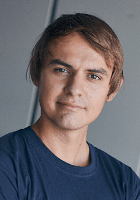- Kyiv School of Economics
- Private: Programs
- Faculty
- Tymofii Brik
Biography
Tymofii Brik is the Rector of the University of the Kyiv School of Economics since 2022. He has been working at the Kyiv School of Economics since 2018. Over the years, he has held the positions of Head of Sociological Research at the KSE Institute and Vice President for International Relations at the university. Since 2018, Brik has been teaching and conducting research in the field of sociology (sociology of religion, social research methods, network analysis, identities).
Tymofii Brik received his PhD in Sociology from the Carlos III University of Madrid (2013) and a Master’s degree in Sociology and Social Studies from the University of Utrecht (2011). In 2023, he was a visiting professor at Northwestern University, where he taught two courses (“Sociology of Religion” and “Ukrainian Society”). In 2018 and 2019-2020, he worked as a visiting scholar at Stanford University and New York University (Wuchinch and Fulbright scholarships, respectively). In 2018, Brik received the Natalia Panina Award for the Best Young Sociologist.
Since 2021, he has been the national coordinator of the European Social Survey (ESS) in Ukraine (an international comparative study that has been conducted in most European countries since 2002).
In addition, Brik was the chairman of the think tank CEDOS supervisory board (Center for the Study of Society). He is a member of the advisory board of Texty.org’s Ratings Sellers project and the advisory board of the research company Gradus. Brik is also one of the co-founders of Urban Space 500, a public restaurant in Kyiv.
Academic publications (list is not complete):
- 2023. “How feeling understood predicts trust and willingness to forgive in the midst of violent intergroup conflict: Longitudinal evidence from Ukraine”. Social Psychological and Personality Science. (with Andrew G. Livingstone, Maria Chayinska, and Evgenia Blyzyuk).
- 2023. “Explaining Ukraine’s resilience to Russia’s invasion: The role of local governance.” Journal of Governance. (with Maryna Rabinovych, Andrii Darkovich, Myroslava Savisko, Valentyn Hatsko, Serhii Tytiuk, and Igor Piddubnyi)
- 2023. “Decentralization and trust in government: Quasi-experimental evidence from Ukraine.” Journal of Comparative Economics (with Helge Arends, Benedikt Herrmann, and Felix Roesel)
- 2023. “Orthodox Churches during the Pandemic in Ukraine and Georgia: Narratives and New Practices”. Problems of Post-Communism (2023): 1-12. (with Tornike Metreveli)
- 2022. “Longitudinal change in language behaviour during protests: A case study of Euromaidan in Ukraine.” Social Network Analysis and Mining, 12(1), 1-12. (with I. Slobozhan and R. Sharma)
- 2020. Attitudes About Privatization and the Shadow of Communism: 25 Years of Anti-market Scepticism. In Ukraine in Transformation (pp. 35-53). Palgrave Macmillan, Cham. (with Oleksii Shestakovskyi)
- 2019. When church competition matters? Intra-doctrinal competition in Ukraine, 1992–2012. Sociology of Religion, 80(1), 45-82.
Publications in the media (the list is not complete):
- 2023. “Ukraine’s resilience: How an administrative reform boosted social capital and trust in Ukrainian communities,” VoxEU / CEPR (31 August, with Helge Arends, Benedikt Herrmann, and Felix Roesel)
- 2022. “The source of Ukraine’s Resilience: How Decentralized Governance Brought the Country Together,” Foreign Affairs (28 June, with Jeniffer Murtazashvili)
- 2022. Is Russia’s wartime propaganda more powerful than family bonds? The Washington Post. (with Aaron Erclich and Jordan Gans-Morse).
- 2020. Trump’s impeachment is not over for Ukrainian citizens. Washington Post blog Monkey Cage. (with Aaron Erclich and Jordan Gans-Morse).

